 Society
Society

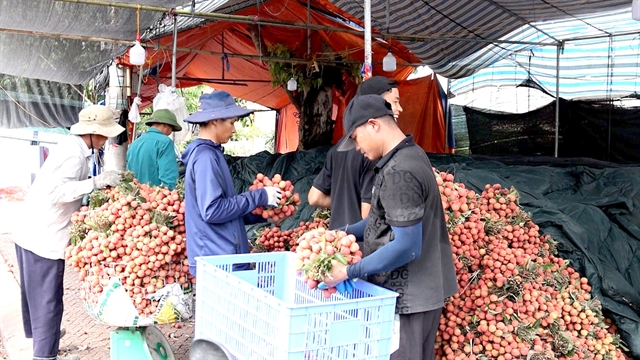 |
| Farmers sell lychees to traders on the main road of Thanh Hà Town. VNS Photo Minh Phương |
By Lê Hương
(with an additional interview by Minh Phương)
HẢI DƯƠNG — Thanh Hà District in the northern province of Hải Dương has witnessed a bumper lychee harvest, with hundreds of tonnes sold domestically and overseas.
The plump, juicy lychees are being sold all along the main streets of Thanh Hà town, the lychee capital of northern Việt Nam.
You can see the excitement on the faces of farmers and traders.
This year’s lychee yield is estimated at around 35,000 tonnes, destined for both domestic consumption and export worldwide.
“This year's early lychee crop is fetching a very good price, and people are excited about the sales," lychee trader Nguyễn Thị Lũ told Việt Nam News.
“The later harvest, however, hasn't done as well in terms of price. This year, our truck is exporting lychees to Laos. The quality is good, the fruit is sweet and Thanh Hà lychees still maintain their value. Whether prices are high or low, they’re still selling. Today alone, I handled 20 tonnes of lychees.”
However, the Chinese market, a major export destination, is currently facing difficulties.
“China is imposing excessively high tariffs on lychees,” said Lê Văn Khởi, another trader.
“The current tariff rate is seven times higher than in 2023, causing purchase prices for lychee in Thanh Hà and Bắc Giang to drop significantly. As a result, lychee exports to China, the main export market, have declined considerably.”
China has put in place new barcode requirements for lychee fruit this year.
“We hope the relevant agencies will work on building a strong brand for Thanh Hà lychees so local farmers won’t have to struggle as much,” Lũ said.
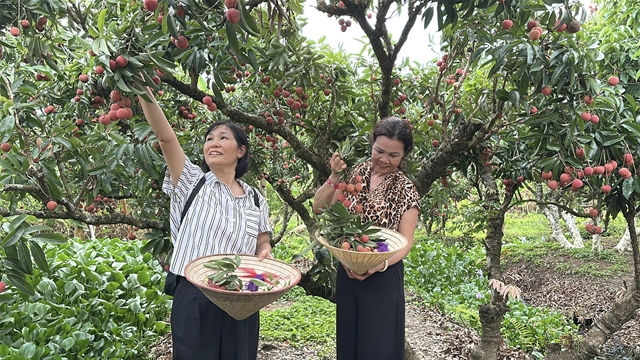 |
| Visitors at the Đồng Mẩn Ecotourism Site. VNS Photo Lê Hương |
Khởi agreed.
“We propose that leaders at both the central and provincial levels find a solution to reduce export tariffs to China next year,” he said. “Only then can stable prices be ensured for lychees.”
The fertile land and mild climate of Thanh Hà have made it home to over 3,200 hectares of lychee orchards.
Local authorities are encouraging farmers to create lychee tours for visitors, aiming to capitalise on the region’s specialty crop.
Tourists can take boat rides along the river and visit orchards to pick lychees themselves.
“This way, we can both promote tourism and sell our lychees directly, letting more people know about them,” said Phạm Thị Liêm, who runs the Đồng Mẩn Ecotourism Area.
“It also helps reduce the costs of harvesting and transporting the fruit, while enabling us to sell at higher prices.”
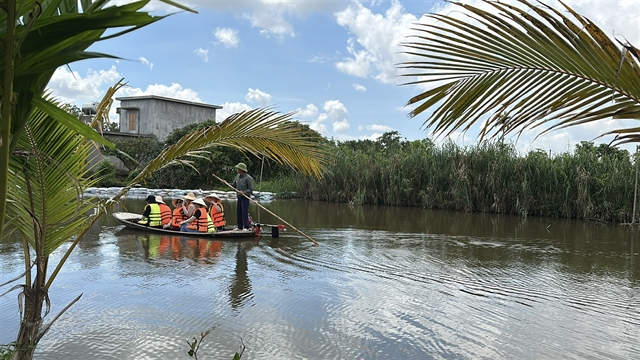 |
| Visitors take a boat trip along a river bordering lychee orchards. VNS Photo Lê Hương |
Liêm said when they combine tourism with lychee farming, the fruit must be fresh, sweet, crisp and truly unique to leave a strong impression. Visitors feel a sense of relaxation on the farms after a tiring day of work in the city.
The Đồng Mẩn Ecotourism site receives nearly 1,000 visitors each day during the peak season.
“This is my first time visiting the Đồng Mẩn Ecotourism Area, and I was really surprised by how peaceful the scenery is,” said 13-year-old tourist Nguyễn Ngọc Trúc Ly.
“It’s been a truly wonderful experience for me and my family.”
Visitor Nguyễn Văn Minh suggested that the ecotourism model be expanded, as Hải Dương has many local specialties, especially Thanh Hà lychees.
“It’s a great way to introduce Thanh Hà lychees to people across the country, while also promoting the area as a relaxing destination for summer holidays or weekend getaways,” he said.
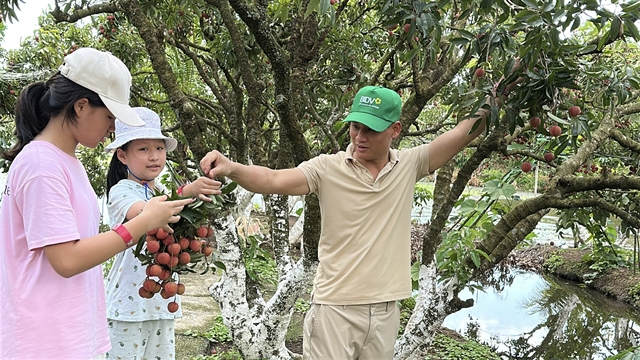 |
| Visitor Nguyễn Văn Minh (left) and his daughters at the Đồng Mẩn Ecotourism Site. VNS Photo Lê Hương |
Farmers are supported through programmes that help develop sustainable livelihoods in lychee cultivation.
“We provide training and support for traceability labels, conduct TikTok classes and teach the application of AI in sales and marketing,” said acting head of the Hải Dương Trade and Tourism Promotion Office Ngô Bá Đức.
“Soon, we will collaborate with tourism associations and travel agencies to organise tours that bring visitors to the Đồng Mẩn Ecotourism Area and Thanh Hà lychee orchards. We also plan to coordinate and sign cooperation agreements with travel companies to welcome international tourists.”
Thanh Hà lychees are famous for their sweetness and delicious flavour.
Now, even more people will come to know Thanh Hà as a must-visit destination for an authentic experience on a lychee farm.
Heritage tree
The ancestral lychee tree in the district's Thúy Lâm Village in Thanh Sơn Commune is on record as the first lychee tree ever planted in Việt Nam, and is closely associated with the origin of the famous Thanh Hà lychee variety.
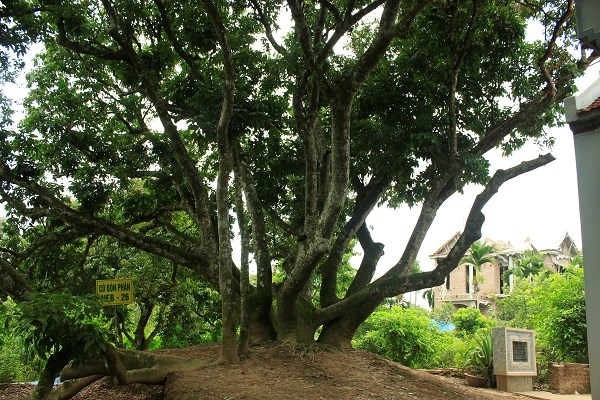 |
| The 200-year-old ancestral lychee tree stands firmly in Thanh Hà District and still bears fruit annually. Photo haiduong.gov.vn |
It was planted by Hoàng Văn Cơm, who lived from 1848 to 1923.
Ancient records state that Cơm used to work as a fruit trader, transporting goods from Hải Dương to Hải Phòng.
During a wedding feast held by the Chinese community in Hải Phòng, he had the chance to taste a delicious lychee variety. Impressed by its flavour, he decided to bring back three seeds to cultivate.
Of those, only one tree, the current ancestral lychee tree, survived and continues to bear fruit with a uniquely fragrant and delicious taste.
Over two centuries later, the ancestral tree still thrives and bears fruit annually, becoming a symbol of the fertile land of Thanh Hà.
Beyond its agricultural value, the tree holds great historical and cultural significance and was officially recognised as a Heritage Tree of Việt Nam in 2012.
It stands as a source of pride for the people of Hải Dương and a living testament to the hardworking and innovative spirit of past generations.
After being cultivated in Hải Dương, lychee trees have been planted in many other localities in Việt Nam, including in Bắc Giang Province. — VNS




